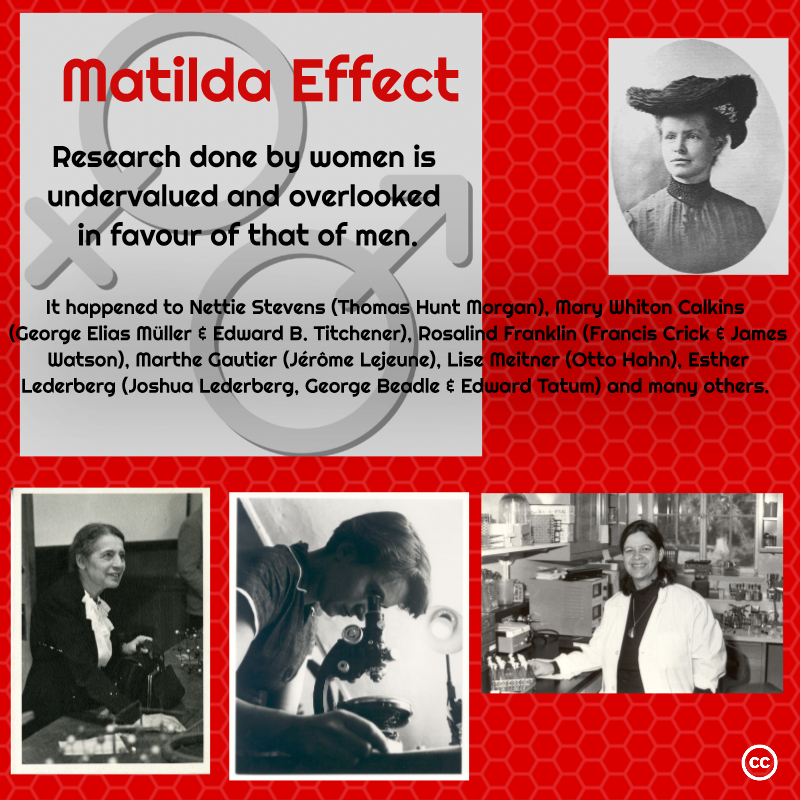Matilda-ilmiö – julkaisuja (epä)tasa-arvosta tieteessä | Matilda effect – publications about (in)equality in science
(Please, scroll down to read in English.)
Termillä Matilda-ilmiö tai -efekti tarkoitetaan taipumusta kieltää tai häivyttää naisten tieteelliset saavutukset ja antaa kunnia niistä miehille. Tieteenhistorioitsija Margaret W. Rossiter (s. 1944) nimesi ilmiön feministi ja ihmisoikeusaktivisti Matilda Joslyn Gagen (1826–1898) mukaan (1).
Vuonna 2015 YK julisti 11.2. kansainväliseksi ”Naiset ja tytöt tieteessä” -päiväksi, joka innostaa ja kutsuu tyttöjä ja naisia suuntautumaan luonnontieteisiin, vastustaa sukupuoliharhaa ja torjuu naisten ja tyttöjen syrjintää luonnontieteissä, tekniikassa ja matematiikassa.
Kirjallisuutta aiheesta
Muutama e-kirjapoiminta UEF-Primosta
- Bystydzienski, Jill M., and Sharon R. Bird. Removing Barriers : Women in Academic Science, Technology, Engineering, and Mathematics . Indiana University Press,, 2006.
- Wolverton, Ann, et al. Breaking in : Women’s Accounts of How Choices Shape STEM Careers . First edition., Stylus, 2016.
- Ceci, Stephen J., and Wendy M. Williams. The Mathematics of Sex: How Biology and Society Conspire to Limit Talented Women and Girls . Oxford University Press,, 2010.
Pari painettua kirjaa
- Bevan, Valerie, and Caroline Gatrell. Knowing Her Place : Positioning Women in Science . Edward Elgar Publishing, 2018.
- Korhonen, Riitta, et al. Tiedenaisia : suomalaisia tutkimuksen ytimessä . Docendo, 2020.
Jokunen avoin artikkeli
- McKinnon Merryn, and O’Connell Christine. “Perceptions of Stereotypes Applied to Women Who Publicly Communicate Their STEM Work.” Humanities & Social Sciences Communications, vol. 7, no. 1, Palgrave Macmillan, Dec. 2020, pp. 1–8, doi:10.1057/s41599-020-00654-0.
- Popp, Anea L., et al. “A Global Survey on the Perceptions and Impacts of Gender Inequality in the Earth and Space Sciences.” Earth and Space Science (Hoboken, N.J.), vol. 6, no. 8, John Wiley & Sons, Inc, 2019, pp. 1460–68, doi:10.1029/2019EA000706.
- Aguinis, Herman, et al. “Gender Productivity Gap Among Star Performers in STEM and Other Scientific Fields.” Journal of Applied Psychology, vol. 103, no. 12, American Psychological Association, Dec. 2018, pp. 1283–306, doi:10.1037/apl0000331.
- Thébaud, Sarah, and Maria Charles. “Segregation, Stereotypes, and STEM.” Social Sciences (Basel), vol. 7, no. 7, MDPI AG, July 2018, p. 111–, doi:10.3390/socsci7070111.
- Helmer, Markus, et al. “Gender Bias in Scholarly Peer Review.” eLife, vol. 6, eLife Science Publications, Ltd, Mar. 2017, doi:10.7554/eLife.21718.
- Lundine, Jamie, et al. “Gender Bias in Academia.” The Lancet (British Edition), vol. 393, no. 10173, Elsevier Ltd, Feb. 2019, pp. 741–43, doi:10.1016/S0140-6736(19)30281-8.
Hae lisää UEF-Primosta.

The term Matilda effect refers to the tendency to deny or hide women’s achievements in science and give the credit to men. Science historian Margaret W. Rossiter (born 1944) named the phenomenon after feminist and human rights activist Matilda Joslyn Gage (1826–1898) (1).
Literature about the topic
Some ebook picks from UEF Primo
- Bystydzienski, Jill M., and Sharon R. Bird. Removing Barriers : Women in Academic Science, Technology, Engineering, and Mathematics . Indiana University Press,, 2006.
- Wolverton, Ann, et al. Breaking in : Women’s Accounts of How Choices Shape STEM Careers . First edition., Stylus, 2016.
- Ceci, Stephen J., and Wendy M. Williams. The Mathematics of Sex: How Biology and Society Conspire to Limit Talented Women and Girls . Oxford University Press,, 2010.
Couple of printed books
- Pollack, Eileen. The Only Woman in the Room : Why Science Is Still a Boys’ Club . Beacon Press, 2016.
- Bevan, Valerie, and Caroline Gatrell. Knowing Her Place : Positioning Women in Science . Edward Elgar Publishing, 2018.
Some open access articles
- McKinnon Merryn, and O’Connell Christine. “Perceptions of Stereotypes Applied to Women Who Publicly Communicate Their STEM Work.” Humanities & Social Sciences Communications, vol. 7, no. 1, Palgrave Macmillan, Dec. 2020, pp. 1–8, doi:10.1057/s41599-020-00654-0.
- Popp, Anea L., et al. “A Global Survey on the Perceptions and Impacts of Gender Inequality in the Earth and Space Sciences.” Earth and Space Science (Hoboken, N.J.), vol. 6, no. 8, John Wiley & Sons, Inc, 2019, pp. 1460–68, doi:10.1029/2019EA000706.
- Aguinis, Herman, et al. “Gender Productivity Gap Among Star Performers in STEM and Other Scientific Fields.” Journal of Applied Psychology, vol. 103, no. 12, American Psychological Association, Dec. 2018, pp. 1283–306, doi:10.1037/apl0000331.
- Thébaud, Sarah, and Maria Charles. “Segregation, Stereotypes, and STEM.” Social Sciences (Basel), vol. 7, no. 7, MDPI AG, July 2018, p. 111–, doi:10.3390/socsci7070111.
- Helmer, Markus, et al. “Gender Bias in Scholarly Peer Review.” eLife, vol. 6, eLife Science Publications, Ltd, Mar. 2017, doi:10.7554/eLife.21718.
- Lundine, Jamie, et al. “Gender Bias in Academia.” The Lancet (British Edition), vol. 393, no. 10173, Elsevier Ltd, Feb. 2019, pp. 741–43, doi:10.1016/S0140-6736(19)30281-8.
Search UEF Primo for more.
This post was inspired by this UEF Event.
Tuulevi Ovaska, erityistietoasiantuntija | Senior Information Specialist
Opetus- ja tietopalvelut | Training and Information Services
(1)Margaret W. Rossiter. “The Matthew Matilda Effect in Science.” Social Studies of Science, vol. 23, no. 2, Sage Publications, May 1993, pp. 325–41, doi:10.1177/030631293023002004. (sorry, no access)